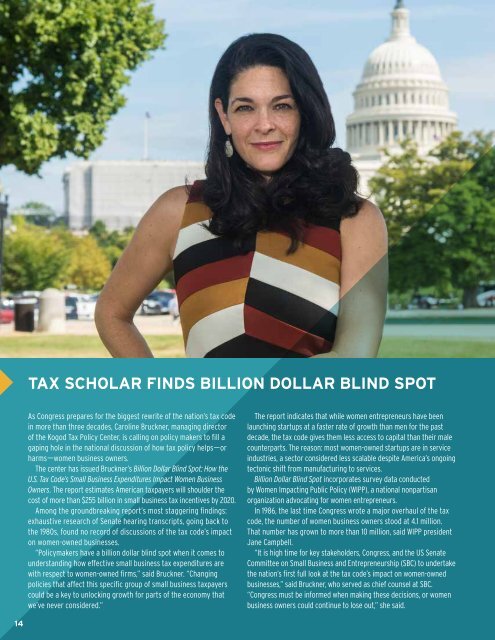American University Annual Report 2016-2017
This annual report surveys American University's strong record of financial growth, facilities expansion, and implementation of diversity and inclusion programs. It also documents the leadership transition from President Emeritus Neil Kerwin to President Sylvia M. Burwell.
This annual report surveys American University's strong record of financial growth, facilities expansion, and implementation of diversity and inclusion programs. It also documents the leadership transition from President Emeritus Neil Kerwin to President Sylvia M. Burwell.
Create successful ePaper yourself
Turn your PDF publications into a flip-book with our unique Google optimized e-Paper software.
TAX SCHOLAR FINDS BILLION DOLLAR BLIND SPOT<br />
As Congress prepares for the biggest rewrite of the nation’s tax code<br />
in more than three decades, Caroline Bruckner, managing director<br />
of the Kogod Tax Policy Center, is calling on policy makers to fill a<br />
gaping hole in the national discussion of how tax policy helps—or<br />
harms—women business owners.<br />
The center has issued Bruckner’s Billion Dollar Blind Spot: How the<br />
U.S. Tax Code’s Small Business Expenditures Impact Women Business<br />
Owners. The report estimates <strong>American</strong> taxpayers will shoulder the<br />
cost of more than $255 billion in small business tax incentives by 2020.<br />
Among the groundbreaking report’s most staggering findings:<br />
exhaustive research of Senate hearing transcripts, going back to<br />
the 1980s, found no record of discussions of the tax code’s impact<br />
on women-owned businesses.<br />
“Policymakers have a billion dollar blind spot when it comes to<br />
understanding how effective small business tax expenditures are<br />
with respect to women-owned firms,” said Bruckner. “Changing<br />
policies that affect this specific group of small business taxpayers<br />
could be a key to unlocking growth for parts of the economy that<br />
we’ve never considered.”<br />
The report indicates that while women entrepreneurs have been<br />
launching startups at a faster rate of growth than men for the past<br />
decade, the tax code gives them less access to capital than their male<br />
counterparts. The reason: most women-owned startups are in service<br />
industries, a sector considered less scalable despite America’s ongoing<br />
tectonic shift from manufacturing to services.<br />
Billion Dollar Blind Spot incorporates survey data conducted<br />
by Women Impacting Public Policy (WIPP), a national nonpartisan<br />
organization advocating for women entrepreneurs.<br />
In 1986, the last time Congress wrote a major overhaul of the tax<br />
code, the number of women business owners stood at 4.1 million.<br />
That number has grown to more than 10 million, said WIPP president<br />
Jane Campbell.<br />
“It is high time for key stakeholders, Congress, and the US Senate<br />
Committee on Small Business and Entrepreneurship (SBC) to undertake<br />
the nation’s first full look at the tax code’s impact on women-owned<br />
businesses,” said Bruckner, who served as chief counsel at SBC.<br />
“Congress must be informed when making these decisions, or women<br />
business owners could continue to lose out,” she said.<br />
14


